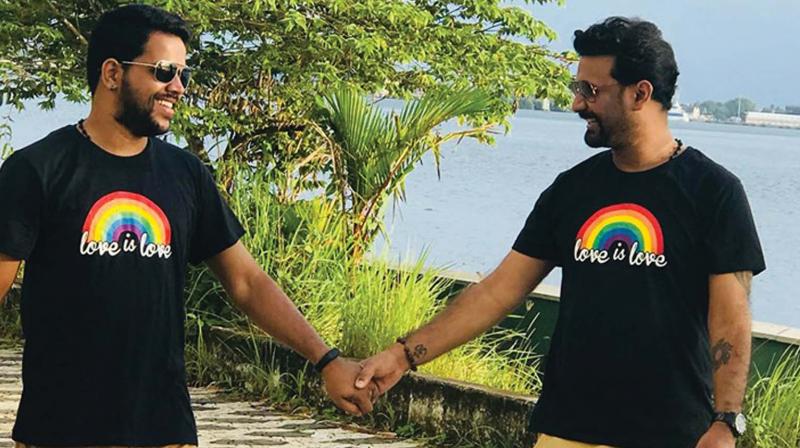Love and live fearless

September 6. It’s the first anniversary of the beginning of the end of prejudice. It’s been one year since the day the Supreme Court struck down the colonial law under Section 377 of the Indian Penal Code that criminalised homosexuality for 158 years. Nikesh and Sonu celebrate the day as their first ‘independence day’.
The duo, who has come out as the first married gay couple in Kerala after they exchanged rings at Guruvayur Sreekrishna Temple a year ago, is elated and proud to announce to the world that they too are citizens of this country.
“Till a year ago, we were considered as criminals. We could never share with anyone the stress and mental agony we have been facing since childhood. Our identity was looked down upon and we could never publicise our relationship. Now, all of it has changed. We no longer hide our identities and relationship status,” says Nikesh, a restaurateur, who married Sonu, a techie, on July 5, 2018, two months before the historic verdict scrapped S377.
The two had come out to their families, who, though appalled at first, slowly realised the facts and accepted them on one condition – that their gay identity remain hidden from the rest of the world. But acceptance from family was not enough for the couple. They wanted to live free.
“Coming before the world was a collective decision Sonu and I made. We had our share of apprehensions but luckily, most of them around have been very supportive. And yes, there still are negative responses – people who frown and hurl abuses. It definitely hurts, but we try to convince those who talk out of ignorance. No one can talk sense into the others, who abuse us for their own sadistic pleasure,” says Nikesh.
Though it lacks legal validity, married life, for them, is pure bliss. “We started to live together after knowing each other very well. Unlike the hierarchy in a married relationship between a man and a woman where each is assigned specific roles by default – for man, earning and for woman, cooking and rearing kids – we don’t try to dominate or belittle each other. We are equals – in earning, daily chores and discussions, and we are happy,” he adds. The couple is awaiting the day their marriage can be legalised. “And to get adoption rights, and to apply for a bank account or insurance writing Sonu’s name in the spouse’s column. It pains us to still tick the column mentioning ‘single’ in application forms,” Nikesh points out.
A year into decriminalising homosexuality, they observe a lot of changes around, though they are aware that there’s a long way to go. “Self-acceptance has started. People have started coming out. Those who have been keeping their identity under the wraps have started fearlessly announcing their relationships.
Participation has increased in monthly meetings of queer groups. That includes teens who come to us to share their problems. It’s a welcome change,” he notes.
Awareness is a long-winding, complicated process, but not impossible. He adds, “Many have no idea about what being a gay or lesbian or asexual or bisexual is. There are people who think that gay persons like to dress up like women, but we want to live like men. It’s just that we are attracted to men. Compared to transgender persons, our visibility is very less. Our identities are different, so are our problems.”
By lesser visibility, Nikesh doesn’t mean that gay people are lesser privileged.
Slamming the controversial Transgender Bill passed in the Lok Sabha with regressive provisions for gender certification and failure in pushing for inclusivity, Nikesh feels that provisions like reservation should be in place for the lesser-privileged transgender community. “Sometimes, hiding identities is a privilege; gay and lesbian people have that, but transgender persons don’t have such a space. They can’t hide the real them and, unable to stand the stigma, will have to drop out of school or live unemployed. But people like us have been able to gain education and career. So, quota is must for their uplift. Everybody deserves a better life,” he stresses.
Scrapping S377 is just the first step towards acceptance, Nikesh feels. “A court order can’t bring about acceptance just like that. A lot of awareness initiatives are required. There are scores of people who believe that LGBTQIA+ community members choose their identity. This is something we are born with and become aware of in our teens. It’s the ignorance of the majority that results in eye-rolls and anger. If they can be convinced, society will accept us all.”
Other than community groups like Queerala and Queerhythm, media and popular culture too have an important role in shaping up social acceptance. “Though there are changes, Kerala is still lagging behind. From comic relief and misrepresentation, popular culture has taken a mature turn in portraying trans, gay, lesbian, intersex and asexual people. Movies like Njan Marykutty have been hopeful.” It’s the country of Rituparno Ghosh. ‘Hopeful’ is a word that brings a lot of positivity. There are more battles to fight, but if winter comes, can spring be far behind?

